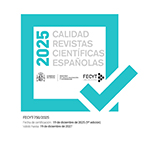Imágenes de una identidad portuguesa y la recepción en Portugal del teatro de Lope de Vega
Resumen
Este artículo propone la discusión del tema de la “materia portuguesa” en el teatro de Lope de Vega, considerando la funcionalidad de las imágenes de una identidad nacional portuguesa, sea en el contexto peninsular de inicios del siglo XVII o en la recepción contemporánea de la obra de Lope en Portugal. El análisis de la comedia El guante de Doña Blanca, y de su traducción portuguesa de 1972, nos permitirá apreciar el complejo diálogo entre referencias históricas y tópicos poéticos, al mismo tiempo que nos conducirá a la reflexión sobre las posibles lecturas políticas de los referentes culturales de la obra dramática del autor. Aunque no lo parezca de modo evidente, Lope de Vega fue también, en cierto modo, un escritor entre culturas.Descargas
Descarga artículo
Licencia
La Revista de Filología Románica, para fomentar el intercambio global del conocimiento, facilita el acceso sin restricciones a sus contenidos desde el momento de su publicación en la presente edición electrónica, y por eso es una revista de acceso abierto. Los originales publicados en esta revista son propiedad de la Universidad Complutense de Madrid y es obligatorio citar su procedencia en cualquier reproducción total o parcial. Todos los contenidos se distribuyen bajo una licencia de uso y distribución Creative Commons Reconocimiento 4.0 (CC BY 4.0). Esta circunstancia ha de hacerse constar expresamente de esta forma cuando sea necesario. Puede consultar la versión informativa y el texto legal de la licencia.










